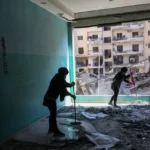The UAE is preparing for Salat al Istisqaa, a special prayer for rain called by President Sheikh Mohamed. Religious scholars are encouraging everyone to join this important act of worship, which carries deep spiritual, societal, and environmental meanings. It is more than just a request for rain, it’s a reminder of humility, repentance, and dependence on Allah’s mercy.
Dr. Abdul Hameed Zafar, an imam at a mosque in Dragon Mart, explained the prayer’s spiritual meaning. “When someone prays Istisqaa, they should understand that rain is a blessing from Allah. It comes only through His mercy,” said Dr. Zafar.
How is the Salat al Istisqaa Prayer Performed?
The Istisqaa prayer consists of two rakahs, much like Eid prayers. It is followed by a sermon with tasbeeh and prayers for forgiveness.
Dr. Zafar shared an interesting tradition: “Believers turn their caps or cloaks inside out during the prayer. This symbolizes hope for change, just as the attire is reversed.” He added that this practice follows the Sunnah of Prophet Muhammad (PBUH), saying, “Rain is vital for agriculture, cooling the weather, and reminding us of the importance of water as a resource.”
Sheikh Ayaz Housee, Imam and Khateeb at Al Manar Centre, emphasized the prayer’s communal and spiritual value. “Istisqaa reminds us of Tawheed (the oneness of Allah), repentance, and our dependence on Him. It brings people together in worship to seek Allah’s mercy,” he said.
He also highlighted how Prophet Muhammad (PBUH) performed this prayer. Quoting a hadith, he shared, “Abu Hurayrah reported: ‘The Prophet (PBUH) performed Salat al Istisqaa with us, offering two rakahs without any Adhan or Iqamah. He then turned towards the Qiblah, raised his hands, and reversed his cloak.’”
Environmental Lessons from Istisqaa
Scholars also pointed out the prayer’s environmental significance. Sheikh Ayaz explained, “The Istisqaa prayer highlights the environmental challenges in the UAE and the region. Beyond its spiritual meaning, it encourages us to save water and adopt sustainable practices.”
He added, “This prayer is a way to humble ourselves before Allah and seek blessings not just for us but for everyone—including farmers, families, and those in need.”
A Call to Join the Prayer
As the day of the prayer approaches, scholars are urging residents to participate and reflect on its deeper meanings. Dr. Zafar said, “It’s a chance to connect with Allah and pray for the nation’s benefit. Following the Sunnah, it offers immense spiritual rewards.”
The Salat al Istisqaa prayer will be held at 11 a.m. on Saturday. Residents are encouraged to visit their local mosques and join this collective act of worship.





